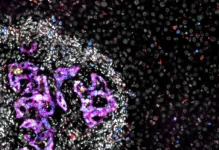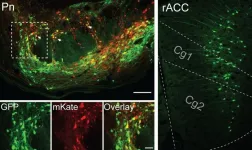Recent developments at MD Anderson include low-dose radiation for B-cell lymphoma, a target for overcoming treatment resistance in pancreatic cancer, decreased public trust in U.S. health agencies providing cancer information, a roadmap for characterizing osteosarcoma tumors, insights into quality of life and survival for adolescent and young adult patients with cancer, a potential target for aggressive breast cancers with p53 mutations, a new understanding of ovarian cancer screening effectiveness, and improved outcomes for patients with renal medullary carcinoma.
Response-adapted radiation demonstrates strong results in indolent B-cell lymphoma
While radiation treatment has proven effective in orbital indolent B-cell lymphomas, questions remain about the long-term impact of moderate-dosed radiation therapy as well as the potential effectiveness of low-dose treatment. Researchers, led by Chelsea Pinnix, M.D., Ph.D., published updated results from a study originally presented at the 2022 American Society for Radiation Oncology (ASTRO) Annual Meeting. The data show that a novel response-adapted ultra-low dose radiation strategy successfully spared the vast majority of patients from high levels of radiation therapy and potential associated toxicities. On the study, 44 out of 50 patients (88%) had a complete response after the low-dose treatment, with just one requiring the full dose for a complete response. There were no local recurrences among the complete responders. The approach has become the standard of care at MD Anderson, and one other cancer centers have since adopted. Learn more in JAMA Oncology.
Targeting myeloid cell protein overcomes pancreatic cancer immunotherapy resistance
Patients with pancreatic cancer often develop resistance to immune checkpoint therapy partly due to the tumor microenvironment (TME), highlighting a need to understand underlying mechanisms. To provide insights, researchers led by Swetha Anandhan, Ph.D., and Padmanee Sharma, M.D., Ph.D., used single-cell sequencing on both immune and non-immune parts of the TME in treatment-resistant pancreatic tumors and in treatment-sensitive melanoma tumors. The study identified a myeloid cell regulating protein, TSG-6, with higher expression in the pancreatic tumors compared to the melanoma tumors. TSG-6 was located in the same area of the TME as tumor-suppressing macrophages with TSG-6 receptors. Blocking TSG-6 in combination with immunotherapy decreased these macrophages, improving immune responses and increasing survival outcomes in vivo. The study highlights the therapeutic potential of targeting TSG-6 to enhance immunotherapy and overcome treatment resistance in patients with pancreatic cancer. Learn more in Nature Communications.
Study finds trust in U.S. health agencies providing cancer information has declined in recent years
Multiple studies have detailed decreasing trust levels in health information from U.S. federal health agencies since 2020, but whether that extends to cancer information has largely been unknown. In a new study led by Sanjay Shete, Ph.D., researchers found that public trust in U.S. government health agencies providing cancer information has fallen from 77.8% in 2020 to 70.1% in 2022. The decline was especially high among specific subgroups, such as respondents aged 18-34 (82.7% in 2020 to 69.6% in 2022), those with some college education (79.9% to 68.5%), and white respondents (77.8% to 77%). Ultimately, the researchers suggest these findings have implications for cancer prevention, treatment and outcomes, given patient trust is critical to the adoption of health recommendations. Learn more in JAMA Network Open.
Single-cell map helps identify personalized tumor characteristics for osteosarcoma
Osteosarcomas are a rare type of genetically diverse bone cancer, making it hard to develop therapeutic strategies beyond standard chemotherapy. To understand how stem cells differentiate and turn into different types of cells, researchers led by Joseph Ludwig, M.D. and Danh Truong, Ph.D., used single-cell sequencing to profile over 31,000 cells from a tissue-engineered lab model, generating a roadmap of the cellular differentiation landscape of three human connective tissue types. The atlas showed that stem-like cells are linked to worse survival outcomes, highlighting its potential for characterizing osteosarcoma tumors, and identifying specific points in cell development that can be targeted for treatment. The roadmap provides a valuable resource for precision-guided medicine that accounts for each patient’s unique tumor characteristics and takes the critical first step in accurately quantifying osteosarcoma differentiation and lineage. Learn more in Clinical Cancer Research.
Poor quality of life at diagnosis may predict overall survival for AYA cancer survivors
Cancer is the most common disease-related cause of death for adolescent and young adults (AYAs), defined as ages 15-39. The overall five-year survival rate for AYAs has grown significantly over the years, resulting in a growing population of cancer survivors. However, AYAs with cancer remain understudied, and data on their health-related quality of life (QoL) is lacking. In a retrospective analysis led by Michelle Hildebrandt, Ph.D., researchers analyzed the health-related QoL scores for 3,498 AYA patients treated at MD Anderson. The results showed that a patient’s physical and mental health-related QoL score at the time of diagnosis was a predictor of their overall survival. Female patients had higher physical component summary scores but lower mental scores compared to male patients. Minority patients also reported lower scores than White patients. The study highlights the association between QoL scores and overall survival among AYA patients with cancer. Learn more in the Journal of the National Comprehensive Cancer Network.
Protein target identified as key mediator in aggressive breast cancers with p53 mutations
TP53 missense mutations correlate with aggressive breast cancer, but little is known about how they drive tumor progression and metastasis. To investigate further, researchers led by Joy McDaniel, Ph.D., and Guillermina (Gigi) Lozano, Ph.D., used lab models with two distinct mammary cell-specific TP53 missense mutations that mimic metastatic triple negative breast cancer (TNBC) and breast tumors resistant to hormone therapy. The study identified that, while each of these mutations led to unique transcriptional programs in tumors, they both were driven by NR5A2 – a nuclear hormone receptor – highlighting its role as a novel key mediator of mutant p53 transcriptional rewiring. These findings provide further insights into the role of TP53 mutations in aggressive breast cancers, such as endocrine-resistant tumors and metastatic TNBC, and highlight NR5A2 as a potential new therapeutic target. Learn more in Cancer Research Communications.
Study clarifies why annual ovarian cancer screening is not effective for all subtypes and may not impact mortality
Ovarian cancer is among the leading causes of gynecologic cancer-related deaths, though more than 70% of patients can survive for at least five years if they are diagnosed early. Currently, only 30% of patients are diagnosed at an early stage, and current screening approaches have not significantly reduced mortality. To understand why, researchers led by Iakovos Toumazis, Ph.D., modeled ovarian cancer progression and estimated the sojourn time – the period from when the cancer is first detected until diagnosis – and sensitivity for different screening methods using a Bayesian approach. This first-of-its kind study showed that annual screening for ovarian cancer is unlikely to be effective in reducing mortality given the short opportunity window to detect type II ovarian cancers. Multimodal screening with CA-125 testing and transvaginal ultrasound was the most sensitive method, but this approach is not sufficient in detecting early-stage ovarian cancer. These findings help to inform and further develop better screening practices for ovarian cancer. Learn more in The Journal of the National Cancer Institute.
Survival outcomes have improved for patients with renal medullary carcinoma
Renal medullary carcinoma (RMC) is a rare and aggressive kidney cancer often diagnosed at a late stage. Its negative prognosis is linked to RMC’s lack of the SMARCB1 tumor suppressor. Researchers led by Nizar Tannir, M.D., and Pavlos Msaouel, M.D., Ph.D., analyzed the clinical characteristics and metastatic patterns of 135 patients with RMC who were treated at MD Anderson between January 2003 and December 2023. In that time period, the study showed an increase in the probability that patients with RMC would survive two years after diagnosis. This is the largest analysis of patients with RMC to date, and it gave important insights into how bench-to-bedside research efforts have improved the survival outcomes for patients with RMC. Learn more in European Urology Oncology.
Awards and honors
Eileen D. Hacker, Ph.D., chair of Nursing, was inducted into the International Nurse Researcher Hall of Fame by the Sigma Theta Tau International Honor Society of Nursing
Paige Taylor, Ph.D., assistant professor of Radiation Physics, was named a Fellow of the American Association of Physicists in Medicine (AAPM).
In case you missed it
Read below to catch up on recent MD Anderson press releases.
MD Anderson expands global oncology efforts through new agreement with Zambia Ministry of Health
MD Anderson ranked No. 1 in the nation for cancer care
Read this press release in the MD Anderson Newsroom.
- 30 -
END



